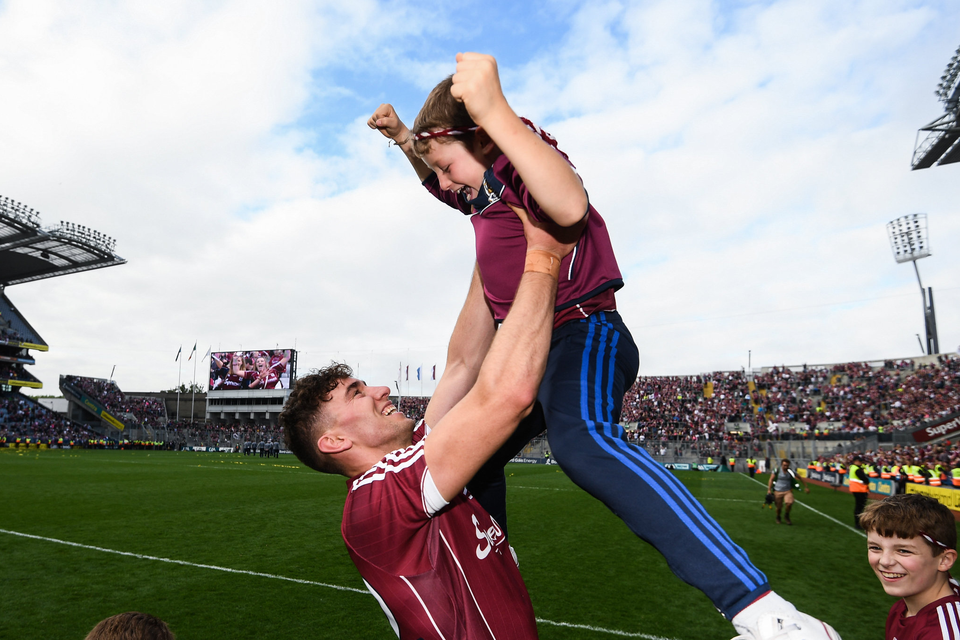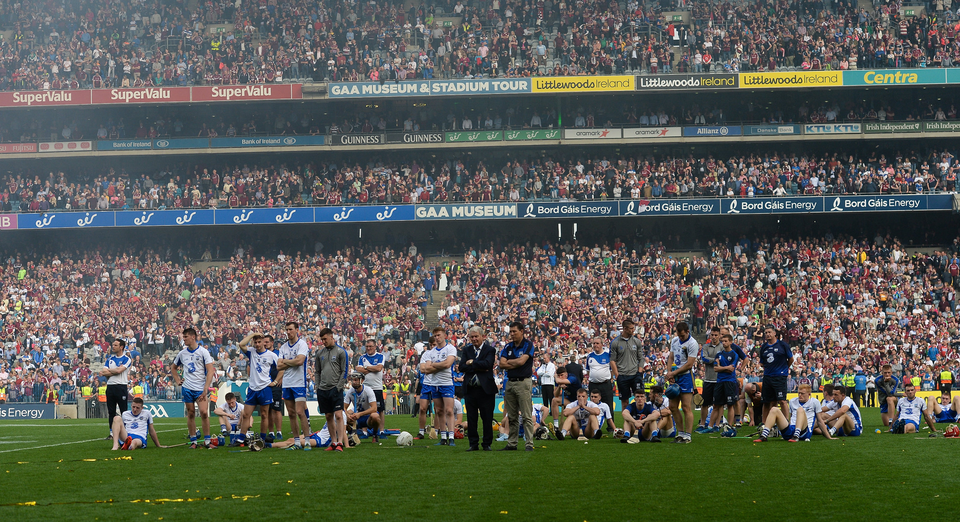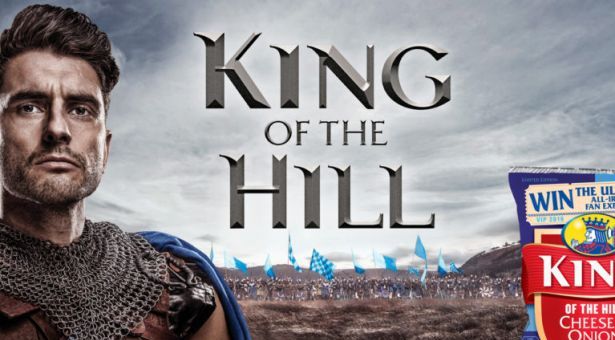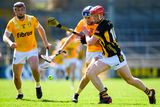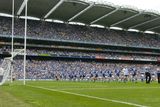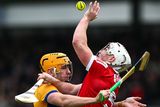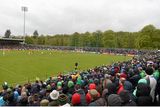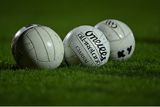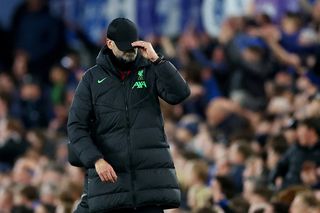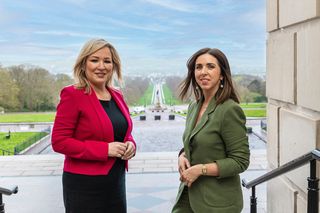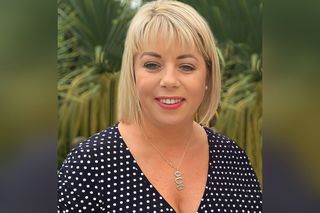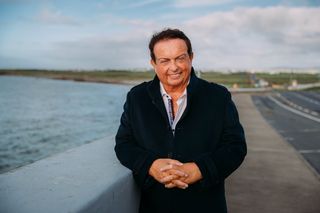Galway highlighted the best of what the GAA has to offer and we'll see much more of it on Sunday
Jason Flynn of Galway celebrates with Jody Canning, nephew of Joe Canning, following the GAA Hurling All-Ireland Senior Championship Final match between Galway and Waterford at Croke Park in Dublin. Photo by Stephen McCarthy/Sportsfile
In a city filled with churches and cathedrals, Croke Park can still at times feel like Dublin’s most sacred site.
A hulking 82,300 seater stadium that stands tall over a sea of semi-detached houses and flats, Croke Park proudly serves as the national home of Gaelic Games.
A magnificent venue, and an increasingly modern tourist attraction, the stadium’s innovative Skyline tour gives visitors a great appreciation for just how big the ground really is, but earlier this month the Waterford Senior Hurling team also gave us an appreciation for just how small of a place Headquarters can be.
When Galway ended their 29-year All-Ireland drought with a three-point win over the Déise on the first Sunday of September, the Waterford team sat there stranded in the middle of Croke Park pondering their latest championship loss.
A minute can feel like an hour after a defeat, although whoever coined that phrase probably never sat through a David Burke acceptance speech before. Some amendments may need to be made there as a result.
But ultimately, the Waterford players had a lot of time to think about their journey as Burke went through the rolecall of Galway’s contributors before lifting the Liam MacCarthy Cup.
Waterford players dejected. Photo by Piaras Ó Mídheach/Sportsfile
As Derek McGrath’s side sat there looking at a triumphant Galway team climbing the steps of the Hogan Stand, a lot of their thoughts would have presumably focused on the nature of their latest defeat, where they go from here, and will they ever reach the top of this mountain that they’re still desperately trying to climb?
But in the immediate days after their All-Ireland heartbreak, Passage defender Noel Connors found some meaning in his side’s loss as well as the larger role of the GAA in Irish society.
“The result didn’t go our way, but this is the one thing that is good about the GAA, it brings so many people together,” said Connors.
“There were the bones of 1,000 people at the hotel on Sunday night, that’s phenomenal when you think about the people who have come from outside of Ireland and travelled miles upon miles just to support Waterford. That’s what the GAA is all about.
“Winning is winning and hurling is hurling, but at the end of the day it’s all about what the GAA stands for and that’s about club, family, and being Irish.”
It was a remarkably profound response from Connors in the wake of the biggest defeat of his intercounty career.
To Connors, the GAA is all about club, family and being Irish, but the GAA can be many things to many people.
To some it’s the Grab All Association. The cultural scourge of Irish society. The chosen games of those that perceive themselves as more Irish than thou.
As Ed Power highlighted last month, for some people in Ireland, disdain for the GAA is a badge of sophistication.
Others like Ken Early see the Irish sporting landscape as more of a fragmented terrain divided by ancient class snobberies.
In a column he penned on the polarising opinion surrounding MMA fighter Conor McGregor, Early wrote: ‘rugby fans sneer at football as a sport for oiks, football fans despise rugby as a sport for fee-paying schoolboys, GAA people think anyone who likes rugby or soccer is a victim of cultural cringe, and so on.’
This can be an exaggerated reality for some but an accurate reflection for others.
Some feel nauseated by the GAA and its culture, others revel in its very existence and its role in Irish society.
Some see a player that plays for the passion of the game and the pride of his county. Others see a man on a billboard advertising crisps one day and a supermarket chain the next.
Some see an association that puts the community first. Others see Sky Sports and the increasing commercialisation of an amateur organisation.
Opinions can crossover and differ, share some views while rejecting others, but the best way to find out what the GAA really means to people is to talk to its players, both past and present.
The Pillar
Former Meath All-Star Christine O'Brien told Cliona Foley last month that the GAA had helped her deal with the loss of her husband Keith, who passed away in 2009 after he was diagnosed with terminal lung cancer.
O’Brien told the Irish Independent: "Apart from my family and great friends, the GAA was my saviour.
“There were lots of times I felt I shouldn't be there, when I felt so sad and had lost so much. I found no joy in sport for a long time but it gave me head-space and physical fitness plus a way back into society.
"When you lose your partner you're not doing so many of the things you used to do together so socially I also needed to get back playing.
"Even when you eventually go out socially you feel you shouldn't be there, or that you're making other people feel uncomfortable, but that's not a factor when you're playing sport.
"I'm eight years down the road now and I love playing again, especially being with all the girls."
The GAA helped O’Brien reintegrate into society after helping her out of a dark place, and while it helped her personally, Gaelic Games are also pivotal to entire areas, not just individuals.
Sean Furey, Naomh Ultan’s 48-year-old full-forward, says that his club is the focal point of his local village Dunkineely, a small village of about 300 people 17km’s outside of Donegal town.
For Furey, and for many others in his local area, the GAA is not only an association but a way of life.
“The club is a big focal point in the area in relation to a meeting point,” said Furey.
“It’s a social hub as well as a sporting club. It’s more than a club. It’s a place for people to meet. If you didn’t have a club, you would not see people for weeks on end.
“On Tuesday night we’ll meet up, we’ll train, we’ll sit down afterwards and have something to eat. We’ll have a chat. It’s more than a club. It’s a way of life really.
“It helps people in the area because if there’s anything happening you’ll hear about it at the club.
“If there was no club it would be a massive loss to our area.”
While the centrality of a GAA club can be a massive benefit for Furey, the localisation of GAA clubs can also be a hindrance and a shaming mechanism for others.
The Post
A couple of weeks ago I met up with a friend from college to watch Barcelona take on Real Betis in their La Liga season opener.
The game took place just three days after Younes Abouyaaqoub drove a van into pedestrians on Las Ramblas in Barcelona, killing 13 people and injuring at least 130 others.
This was the first game Barcelona FC would play following the attack but it was also the club's first league game without Neymar following the Brazlian’s record breaking defection to Paris Saint-Germain.
Naturally, there was a lot to talk about, but after returning from a quick trip to the bar to sit down and watch the match, my friend stared angrily at his phone before blurting out: “For f**k sake, this is what I hate about the GAA.”
He had been working 40 hours a week at a national broadcaster in Dublin. He had worked another job on the side to save up funds and he was coming towards the end of an internship where he was pushing hard for a full-time job.
He was close to gaining full-time employment in the capital, but he still tried as often as he could to get back to his home club on the other side of the country. It was championship season and his club had made it to their final. Unfortunately, he was unable to attend as he was in work that day.
His club lost and he was greeted with a sly message from a long serving club member: “Thanks for turning up today.”
“I love the GAA,” he turned and said to me.
“But this is what turns people off it, s**t like this. What am I supposed to do?”
It’s a good question. I faced a similar situation a few years earlier when I went to a friend’s birthday where the party had an open bar.
The only catch was that the bartender was a longserving member and an assistant manager of my local GAA club.
The players had been placed on a drinking ban and I was asked to go to the bar like a human yoyo to bring back a wide variety of drinks so that the players would not be caught out by the assistant manager.
40 minutes and six trips to the bar later, the makeshift bartender had sniffed out that something was awry and he wore the look of a frustrated detective unable to take down his suspects, for the simple crime that they had been socially enjoying themselves a week before their next game.
It puzzles you, this awkward underbelly to a set of sports that are championed as pillars of the community, but where elder members watch players like hawks to catch them out socially or to shame them if they miss a game due to work commitments 225km’s away. There’s two sides to every coin.
But when that coin came up heads for Galway earlier this month, the emotion afterwards was undeniable. The months of sacrifice, both on and off the pitch, all of a sudden seemed justified.
The iconic images of Galway manager Micheál Donoghue taking a knee and embracing his sons Niall, Con and Cian was immensely powerful.
As was Jason Flynn hoisting Jody Canning, Joe Canning’s nephew, joyfully into the air.
What about when Conor Whelan proudly carried a flag around Croke Park with his cousin Niall Donohue’s name and face emblazoned across its front.
Or when Sean Canning gave his wife Josephine a sly kiss on the cheek as they watched their son Joe celebrate his finest hour.
How about when Canning and Donoghue stood proudly beside Shannon Keady, eldest daughter of the late Tony Keady, as they watched David Burke give a very long, but very memorable speech on the Hogan Stand.
This is what the GAA is all about. To Connors, the GAA stands for club, family and being Irish, but this was what it is really about, these moments.
Its underbelly can be dark, and at times shameful, but Galway’s win shone the light of the association’s qualities brighter than ever.
Hopefully that glow can illuminate Croke Park once again on Sunday. A big stadium that will undoubtedly be littered with little moments of magic.
Jason Flynn of Galway celebrates with Jody Canning, nephew of Joe Canning, following the GAA Hurling All-Ireland Senior Championship Final match between Galway and Waterford at Croke Park in Dublin. Photo by Stephen McCarthy/Sportsfile
